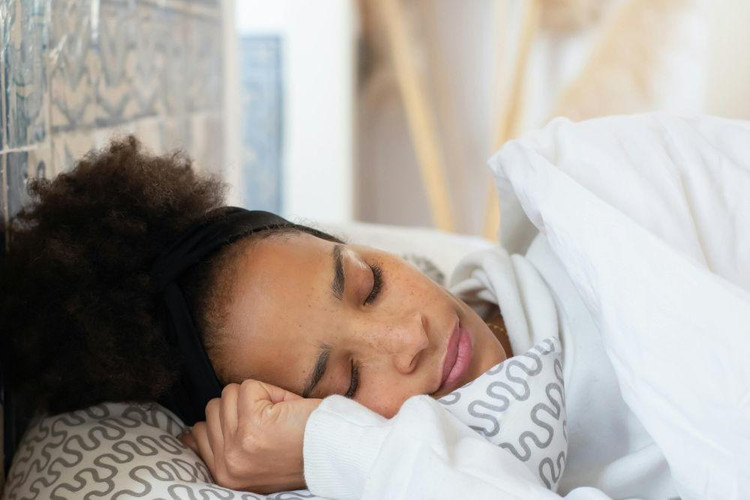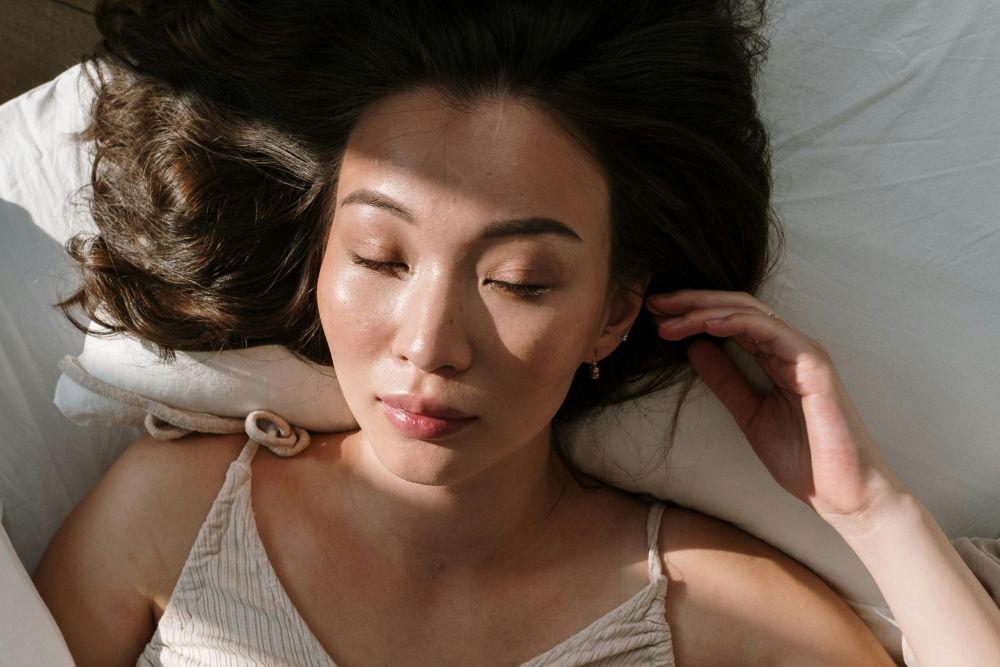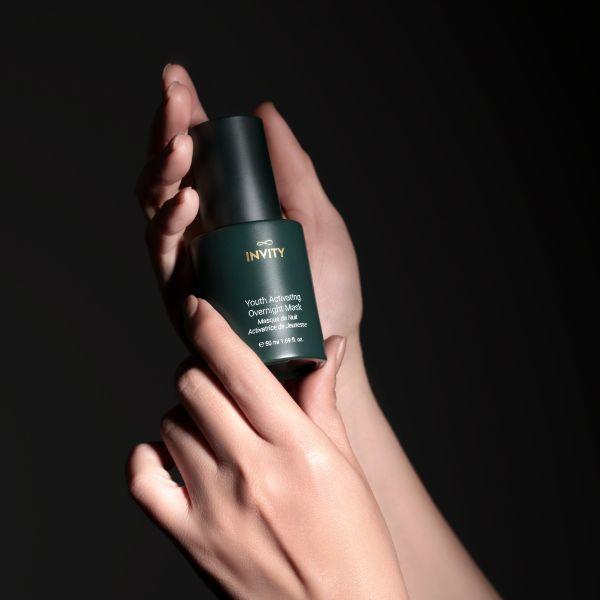Sleep and Skin Health: Understanding the Vital Link
Posted by Invity on 9th Apr 2024

There’s a reason they call it beauty sleep. We’ve probably all presented a haggard face to the world after a bad night’s sleep, but what we see on the surface is the least of what’s happening in our bodies when we don’t get enough, good-quality sleep.
Let’s unpack the intricate relationship between sleep and health, and how sleep (or a lack thereof) affects our skin. Plus we’ll explore simple ways to maximise your beauty sleep for a healthier, brighter, more alert and radiant you.
Are You Getting Enough Sleep?
Unfortunately, in today's 24/7 society, sleep deprivation has become a pervasive issue that affects millions worldwide, to the extent that the World Health Organization has pointed to a ‘global epidemic of sleeplessness’, with roughly two-thirds of adults sleeping less than 8 hours a night, as quoted in the Oxford Academic journal Brain.
It’s important to understand that it is not just about the number of hours we spend asleep. The depth and quality of that sleep also truly matter.
How much are sleep-deprived people averaging a night?
Adults need between 7 to 9 hours of good quality sleep, according to the CDC. Teens and young children need even more. But most people around the world are falling short of that. Some get as little as 5 to 6 hours or even less on a regular basis.
‘Not getting enough sleep is linked with many chronic diseases and conditions—such as type 2 diabetes, heart disease, obesity, and depression—that threaten our nation’s health,’ the US Centers for Disease Control and Prevention (CDC) says.
Why is this happening?
Our lifestyle
The trouble with our fast-paced modern world – our busy lives, work demands, the pervasiveness of technology, and our lifestyle choices – is that sleep is often deprioritised.
This can cause chronic sleep deprivation – long-term lack of sufficient sleep – for many of us.
Sleep disorders
The most common sleep disorders that affect us:
Insomnia
Difficulty falling asleep, staying asleep, or poor sleep quality, frequently caused by stress, anxiety, medical conditions, or lifestyle habits.
Sleep apnoea
Disrupted breathing during sleep, leading to frequent awakenings and poor sleep quality, commonly caused by obesity, anatomical factors, or underlying medical conditions.
Menopause-related insomnia
Commonly experienced by women during menopause; hot flashes, night sweats, hormonal changes, and mood disturbances lead to disrupted sleep patterns and insomnia.
Little wonder, then, that health experts are constantly raising the alarm about the global sleep-deprivation epidemic. It is having a profound detrimental impact on our general health, our skin’s health and youth, and our mental and emotional wellbeing.
Bottom line, you need to take your sleep seriously.
What Our Body Does As We Sleep
It would be a mistake to think that as we sleep, our bodies are snoozing, too. In fact, our brains are very active at different phases of our sleep cycle. Our bodies, while slowed down, are also engaged in many vital repair processes that support our physical, mental, and emotional health. Here’s what happens:
Sleep and our bodies
Cell repair and regeneration: our bodies enter repair mode, working to repair and regenerate damaged cells and tissues throughout our body, including the skin.
Immune function boosted: Adequate sleep supports our immune system, helping to fend off illnesses and infections. During sleep, our immune cells are activated, and they produce more cytokines, which help to fight off infections.
Our hormones are regulated: Sleep is essential for hormone regulation and healthy balance, including hormones involved in metabolism, appetite control, stress response, and growth and development.
Blood sugar levels are balanced: Adequate sleep plays a role in regulating blood sugar levels and insulin sensitivity. Chronic sleep deprivation can lead to insulin resistance and an increased risk of type 2 diabetes.
Cardiovascular health is supported: During sleep, blood pressure and heart rate decrease, giving the heart a chance to rest and recover. This is associated with a lower risk of cardiovascular diseases such as heart disease and stroke.
Muscle repair and growth are activated: During deep sleep stages, growth hormone is released, stimulating muscle growth and repair. This is especially important after physical activity or exercise.
Sleep and our brains
Brain health is supported: Sleep is crucial for brain health and cognitive function. It allows our brains to rest and recharge, clearing out toxins and metabolic waste products accumulated during the day.
Memories are consolidated: During deep sleep stages, several vital processes occur – our brains process and consolidate memories, helping us retain information and learn new skills.
Emotional well-being and mental health are promoted: Quality sleep is essential for this. It helps regulate mood, reduce stress, and improve resilience to emotional challenges. No one needs to tell us that when we are tired, we’re much more prone to irritability and a depressed mood.
Sleep and our skins
Last but not least, sleep is crucial for the health and appearance of our body’s largest organ – our skin.
The body produces collagen, a protein that helps maintain skin elasticity and firmness, during sleep.
Skin hydration, repair, and regeneration are supported, leading to a healthy, glowing complexion.
The Consequences of Poor Sleep
All the factors mentioned above are affected when we sleep badly. Chronic sleep deprivation disrupts the delicate balance of hormones in the body, leading to increased levels of stress hormone cortisol, increased inflammation, and a weakened immune function.
This can cause many chronic diseases and conditions, as mentioned above by the CDC.
Sleep’s Impact on Skin Health
Sleep deprivation shows on our skin, too.
A number of studies have shown that sleep-deprived individuals are more likely to show signs of premature ageing, such as fine lines, wrinkles, and uneven skin tone, compared to those who get adequate rest. It can also cause dullness and dehydration, and it makes us more susceptible to acne and other inflammatory conditions.
The cortisol connection
Cortisol, the so-called stress hormone, plays a vital role in the body's response to stress and inflammation, and lack of sleep messes with our cortisol levels.
Raised cortisol can disrupt our collagen production and skin barrier function, aggravating skin conditions such as eczema and psoriasis.
Also, long-term high cortisol levels can degrade existing collagen in the skin, contributing to the development of wrinkles, sagging, and other signs of ageing.
Raised cortisol levels can also worsen acne by promoting inflammation, stimulating oil production, and compromising the skin's ability to heal and regenerate.
Inflammation and skin
Sleep deprivation also triggers inflammation in the body, which can worsen skin conditions and compromise skin health. It induces oxidative damage, degrading collagen and elastin fibres, and impairing the skin's ability to repair and regenerate.
This is why sleep-deprived people are more prone to inflammatory skin conditions such as acne, rosacea, and dermatitis. They may also experience delayed wound healing and compromised skin barrier function, which leads to irritable skin and dehydration.

Sleep hygiene strategies. Image: Pexels.com/Cottonbro Studio
Sleep Hygiene Strategies for Better Sleep and Skin Health
The good news is that there is a lot you can do to have better sleep. First we need to understand our body’s circadian rhythms, and then we need to practice good sleep hygiene.
Understanding Our Circadian Rhythms
Circadian rhythms are our internal body clocks – the intricate system at the core of our body's sleep-wake cycle. They regulate various body processes, including our sleep patterns, hormone secretion, metabolism, and even skin functions.
They synchronise these with the external environment, largely influenced by light and darkness.
They work together with the brain's pineal gland, which produces our ‘sleep hormone’ melatonin to help regulate sleep-wake cycles. Melatonin production increases in response to darkness, signalling to our bodies that it's time to sleep. Conversely, melatonin production decreases when exposed to light, signalling wakefulness.
Optimising our circadian rhythms
Routine is important
Maintaining a consistent sleep schedule by going to bed and waking up at the same time each day helps regulate our internal clock, for optimal health and skin vitality.
- You should establish a consistent sleep schedule, aiming for 7-9 hours of quality sleep each night.
- Try to align with your body’s natural wake-up time to ensure adequate rest.
You can track your sleep quality and cycle is made easy with apps such as Sleep Cycle or Shut Eye: Sleep Tracker, available on app stores.
Besides monitoring your sleep patterns, some offer sleep-aid options to help you fall asleep (e.g., a bedtime story, white noise or music), and adjust your wake-up time to gently rouse you during your lightest sleep phase.
Daytime
We can regulate our sleep-wake cycle by exposing ourselves to natural light, particularly in the morning. This synchronises our circadian rhythm with the external day-night cycle and tells our body it's time to wake up and be alert.
- Aim for at least 30 minutes of morning-light exposure, ideally within the first hour of waking, even if it's just for a short walk or sitting by a window. This sets you up for a more restful sleep later in the day.
- Try to exercise daily, but finish by early evening to ensure both your body and mind are ready for rest.
Nighttime
- Including certain foods in your evening meal can contribute to better sleep quality:
The amino acid tryptophan helps our bodies produce serotonin and melatonin, promoting relaxation and better sleep quality. Tryptophan-rich foods include turkey, chicken, dairy, soy, eggs, nuts, and seeds (almonds, sesame, pumpkin).
Magnesium-rich foods, such as leafy greens, legumes and nuts, also help relax muscles and regulate neurotransmitters involved in sleep.
Supplements containing magnesium or amino acids such as PEA can also help improve sleep quality by supporting cellular health and regulating neurotransmitters, for more restorative sleep. - Reserve your bedroom for sleep. Create a cool, dark, and quiet environment conducive to rest.
- So, don’t bring technology to bed. Artificial light, especially blue light from screens, can disrupt circadian rhythms and melatonin production. Minimising this light exposure in the evening can help maintain a healthy circadian rhythm and improve sleep quality. Rather listen to calming music or read a book.
Make your bedtime a sleep sanctuary
Create a relaxing bedtime routine to signal to your body that it's time to unwind and prepare for sleep. You will be amazed how you can improve your sleep quality and overall well-being.
Begin your wind-down routine an hour or two before bed:
- Avoid late-night meals, caffeine, and alcohol consumption. Instead, opt for soothing, caffeine-free beverages like camomile or lemon balm tea
- Power down your devices or minimise exposure to blue light from screens by using apps that adjust screen light to warm or filter out blue light
- Indulge in a warm bath before bedtime to relax your body and mind. Dim harsh bathroom lights and set the mood with aromatherapy candles like lavender or camomile for a therapeutic experience
- Consider adding sleep-enhancing products such as lavender essential oil to your bath routine for added relaxation
Maximise your beauty sleep

Besides your usual cleansing and moisturising routine to get rid of the day's grime and make-up, it’s time to optimise your skin's overnight repair process with smart skincare choices that boost repair and renewal.
.
Your 8 hours of beauty sleep in a bottle
Invity’s Youth Activating Overnight Mask is a smart formula designed to help you get a good night’s rest as it supports your skin with powerful skin-repair properties. It has antioxidant, anti-inflammatory and anti-ageing actions, thanks to
Immunight (French lavender extract) helps synchronise your skin’s circadian rhythms as you get a restful night's sleep, so you and your skin awake refreshed.
All told, the light, comforting mask helps to banish signs of fatigue, boost skin elasticity and resilience as it improves texture, hydration and radiance intensely.
You can maximise the full potential of your beauty rest by pairing the overnight mask with an intensive serum. Our ideal partner is Youth Activating Retinoid Serum.
Quiet your mind
Manage stress with relaxation techniques:
- Practice stress-reduction techniques such as meditation, deep breathing exercises, or gentle yoga to promote relaxation and alleviate tension.
- In bed, try a relaxation technique by lying in bed with your eyes closed, focusing on deep breathing. Visualise a gradual "powering down" of each part of your body, starting from your toes and working your way up to your head.
And So, Good Night!
We hope you’ve found this article enlightening and helpful in understanding that sleep isn’t a luxury. It plays a pivotal role in maintaining both general health, our wellbeing and our skin wellness.
By making small changes to our habits, we can enjoy better sleep and be healthier. So let’s prioritise restorative sleep and reap the benefits of looking and feeling and looking our best every day.
Sweet dreams...